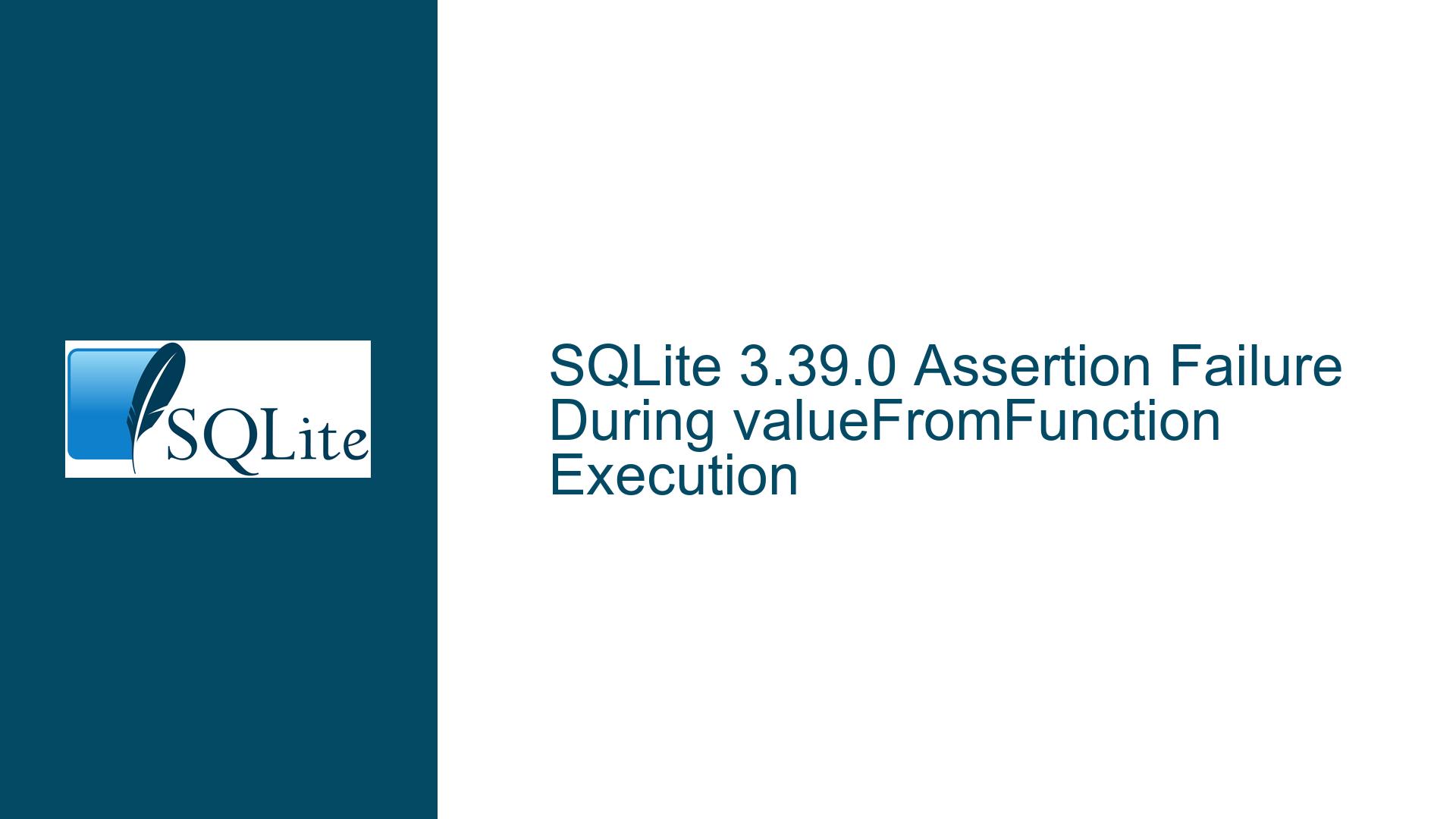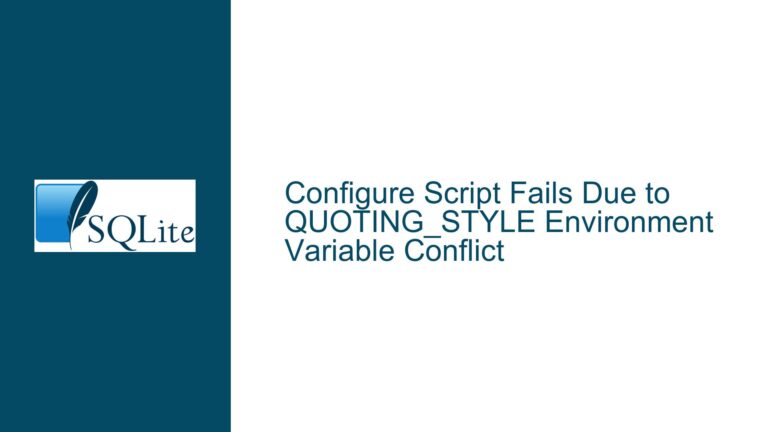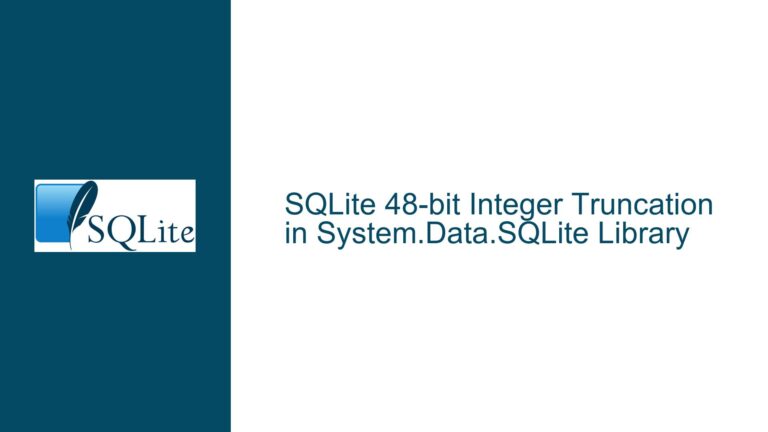SQLite 3.39.0 Assertion Failure During valueFromFunction Execution
Issue Overview: Assertion Failure in valueFromFunction During Complex Query Execution
The core problem involves an assertion failure triggered during execution of a complex SQL query sequence in SQLite version 3.39.0. The failure occurs at line 80164 of sqlite3.c with the message Assertion 'pCtx->pParse->rc==SQLITE_OK' failed, specifically within the valueFromFunction() routine that handles SQL function evaluation during query processing. This manifests as a crash when executing a multi-statement SQL script containing table creation with constraints, statistical analysis commands, and nested JOIN operations combined with aggregate functions and large BLOB handling.
Three critical technical elements converge here:
- Schema Design Complexity: A UNIQUE constraint with conflict resolution (ON CONFLICT IGNORE) combined with a CHECK constraint using LIKE pattern matching on FLOAT values
- Query Execution Context: Use of ANALYZE followed by self-referential JOINs with NATURAL JOIN and negative numeric join conditions
- Function Evaluation Edge Case: The zeroblob() function with 4GB parameter size combined with GLOB pattern matching in HAVING clause
The assertion failure indicates an internal consistency check failed during query compilation/execution – specifically that the parser context (pParse) maintained an OK status code when evaluating function parameters. This occurs at the intersection of SQL function argument validation (for zeroblob()), constraint checking (UNIQUE and CHECK clauses), and statistical optimization (ANALYZE command).
Possible Causes: Version Mismatch, Compilation Flags, and Query Edge Cases
Modified SQLite Build: The line number discrepancy (user reports 80164 vs. maintainer’s 80168) suggests either:
- Local source code modifications altering function stack layout
- Accidental mixing of development branch code with version 3.39.0 tags
- Compiler optimization differences changing debug symbol alignment
Compilation Flag Interactions: The combination of -DSQLITE_DEBUG=1 with -DSQLITE_ENABLE_QPSG (Query Planner Stability Guarantee) may create untested code paths when combined with:
- FTS5/R-Tree extensions modifying virtual table handling
- RBU (Resumable Bulk Update) extension influencing transaction states
- DEBUG mode altering assertion sensitivity
Query-Specific Triggers:
- Double v1 Column Reference:
INSERT INTO v0(v1,v1)attempts duplicate column insertion - Numeric JOIN Condition:
JOIN v0 ON -1.100000creates implicit boolean expression context - Mixed-Type Comparisons:
v1 > 'v1'in HAVING clause with FLOAT vs TEXT coercion - Oversized zeroblob(): 4294967296 bytes (4GB) exceeds practical memory limits
- CHECK Constraint on FLOAT:
v1 NOT LIKE 'v1'applies string pattern matching to numeric column
- Double v1 Column Reference:
Statistical Analysis Impact: The ANALYZE command preceding the crash may have:
- Generated corrupted sqlite_stat1 entries for the UNIQUE constraint
- Created faulty cost estimates for the NATURAL JOIN self-reference
- Interfered with RBU extension’s bulk operation tracking
Troubleshooting Steps, Solutions & Fixes
Phase 1: Environment Validation
- Verify SQLite Version Authenticity
- Execute
SELECT sqlite_version(), sqlite_source_id(); - Compare checksum against official 3.39.0 amalgamation
- Rebuild from pristine source using:
fossil clone https://www.sqlite.org/src sqlite.fossil fossil open sqlite.fossil version-3.39.0
- Execute
- Compiler Flag Audit
- Ensure -O0 (no optimization) with -g (debug symbols)
- Remove conflicting flags from other build systems
- Rebuild with:
CFLAGS="-DSQLITE_DEBUG=1 -DSQLITE_ENABLE_FTS5 -DSQLITE_ENABLE_STAT4 \ -DSQLITE_ENABLE_RTREE -DSQLITE_ENABLE_DBSTAT_VTAB -DSQLITE_ENABLE_RBU \ -DSQLITE_ENABLE_QPSG -O0 -g" ./configure --enable-debug
- Memory Subsystem Check
- Test zeroblob(4294967296) in isolation:
SELECT zeroblob(4294967296); - Monitor for ENOMEM errors or malloc failures
- Adjust ulimit -v and SQLITE_MAX_MEMORY settings
- Test zeroblob(4294967296) in isolation:
Phase 2: Query Deconstruction
- Constraint Isolation Test
- Create minimal table without constraints:
CREATE TABLE v0(v1 FLOAT); - Gradually reintroduce UNIQUE and CHECK constraints
- Create minimal table without constraints:
- JOIN Condition Analysis
- Test NATURAL JOIN behavior with numeric expressions:
SELECT * FROM v0 AS x JOIN v0 ON -1.1; - Verify implicit boolean conversion rules
- Test NATURAL JOIN behavior with numeric expressions:
- Function Evaluation Order
- Break down the failing SELECT into components:
- Test zeroblob() size threshold: 4294967296 vs 2147483647 (signed INT_MAX)
- Separate GLOB pattern matching from HAVING clause
- Validate type coercion in
v1 > 'v1'comparison
- Break down the failing SELECT into components:
Phase 3: Code-Level Diagnosis
- Assertion Context Analysis
- Set breakpoint at sqlite3.c:80164 in debugger
- Inspect pParse->rc value when assertion fires
- Trace back through sqlite3ResolveExprNames() calls
- Parser State Tracking
- Monitor pParse->nErr during:
- CHECK constraint verification
- VIEW resolution in FROM clause
- HAVING clause expression tree generation
- Monitor pParse->nErr during:
- Query Planner Output
- Run EXPLAIN QUERY PLAN on failing SELECT
- Verify if ANALYZE created optimal indexes
- Check for full table scans vs index usage
Final Fixes and Workarounds
- Immediate Mitigation
- Replace zeroblob(4294967296) with smaller value
- Cast HAVING clause to explicit type:
HAVING CAST(v1 AS TEXT) > 'v1'
- Schema Modification
- Avoid FLOAT for pattern matching constraints:
CHECK(CAST(v1 AS TEXT) NOT LIKE 'v1')
- Avoid FLOAT for pattern matching constraints:
- Query Restructuring
- Separate the self-referential JOIN into CTE:
WITH cte AS (SELECT * FROM v0) INSERT INTO v0 SELECT ... FROM cte...
- Separate the self-referential JOIN into CTE:
- Compilation Adjustment
- Disable QPSG for complex queries:
PRAGMA query_planner_stability_guarantee=OFF;
- Disable QPSG for complex queries:
- Version Upgrade
- Migrate to SQLite 3.39.4+ containing assertion fix
- Backport commit cd6254fcd3 to 3.39.0 if needed
This comprehensive approach addresses both the immediate crash scenario and underlying stability issues in complex query handling. The combination of environmental validation, query decomposition, and low-level debugging provides multiple vectors for resolving assertion failures while improving overall SQLite robustness.






